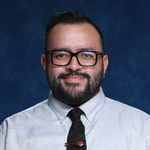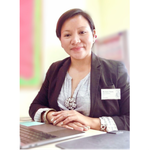活动日程
- 登记
嘉宾将领取会议徽章并签到参加会议。
- 欢迎辞
安远 - 分组讨论 #1
- 分组讨论 #2
- 午餐
在场地餐厅享用午餐。
- 分组讨论 #3
- 分组讨论 #4
- 休息
- 主题演讲 • Daniel Sobel
- 结束公告
安远
- From Page to Brain: Factors Influencing Reading Speed and Comprehension in English Language Reading Materials
Suzanne Robare, M.S, M.T.E.What are the factors influencing reading speed and comprehension for students, especially non-native speakers, when reading in the English language?
A brief overview of the reading process, from eyes moving across a page, brain mapping of sound/symbol correspondence, and finally, comprehension of materials, is presented. Takeaways include utilizing different types of data to identify students who need additional support, and support strategies that can be dropped in most existing reading and learning support programs.
- Empowering Parents: Practical Approaches to Support Social Communication and Language Development in School-Age Children
Ian HsiehThis session will explore how parents can support social communication and language development in school-age children with practical approaches that emphasize their children’s strengths. These approaches can assist educators in connecting with their communities and delivering more impactful services for students.
- Understanding Brain Diversity: Embracing Individual Differences in Education Amid Rapid Technological Change
Junqi ZhuoIn this presentation, we'll explore some of the exciting new developments in neuroscience, focusing on how each person's brain works differently and how children's brains develop in unique ways. We'll discover how these individual differences and varying developmental speeds add to the richness of our diverse world and post special challenges to parents and educators. We'll also look at how artificial intelligence and the rise of short videos are rapidly changing our behaviors and impacting our brains. Finally, we'll introduce a practical framework to help us navigate and address the challenges that come with these fast-paced changes.
- Empowering Executive Function and Self-Regulation: Practical Strategies for Children and Adolescents
Fengyi KuoParticipants will gain an understanding of executive function and its critical role in learning and development. Strategies and developmental activities to support executive function and self-regulation will be demonstrated and practiced.
- Parent Perspectives: Why do we keep trying, and failing, to force-fit neuro-divergent children into neuro-typical systems
Monte RosenA presentation/discussion on the challenges parents face, and suggestions for how professionals can better support parents in the international school system. Monte will share his unique experience of having two adult neurodivergent children who went through the international school system in Shanghai.
- From Classroom to Community: Social Innovation in Student Support Services
Erik Gutiespi•Yi ZhaoPurpose of the Presentation
To share Daystar Academy’s approach to supporting students of all abilities through innovative programs and tailored interventions. We aim to inspire educators with practical strategies that foster social-emotional growth and academic success.
Key Topics Covered
-Daystar’s Commitment to Social Innovation in Education
Addressing societal pressures with balanced, student-focused support
-Tailored Support Programs
-Mental well-being classes, group interventions, and personalized support
-Multi-tiered Intervention Framework
-Three levels of support to meet diverse needs, with regular team collaboration
-Data-Driven Results
-Evidence of improved student independence and happiness
-Implementing Innovative Support Systems in Schools
-Practical takeaways for educators
This session will offer valuable insights and inspire new approaches to student support. Thank you for considering our proposal. We look forward to the opportunity to contribute to the conference.
- If I can do it...
Samantha ReddiarIn this presentation, I will share how the implementation of simple, yet effective strategies has significantly impacted student learning, particularly in the area of narrative writing. By leveraging the power of technology, I will demonstrate how other educators can replicate these successful approaches and empower their students to excel in narrative writing. Through practical examples and hands-on activities, I will equip fellow teachers with the tools and knowledge necessary to enhance their students' writing skills and foster a love for storytelling in the classroom.
- Navigating ADHD: Behavior Management Strategies for Success
Yun Liu
- Third Culture Kids • Parent and Student Panel
Janice Bareng-PinedaJoin us for a parent and student panel discussing the unique experiences of Third Culture Kids (TCKs). We'll explore the challenges and opportunities of growing up in multiple cultures, including identity, belonging, and adapting to change. This open dialogue will provide insights into how both children and parents navigate their multicultural lives.
- Inclusive Teaching: The Impact of Modeling on Learner Success
Elizabeth Boisselle
- Principles for Optimizing Interventions
Stephenie LeeIn recent years, there are many frameworks for understanding student development that accompany the many therapeutic programs designed to provide support for delays in social development, reading abilities, comprehension skills, sensory motor development, etc. When these programs and frameworks hit the market, educators, institutions, and families are faced with difficult decisions around whether or not a new program, diagnosis, or framework will be helpful for supporting a child with special needs. What are the principle considerations to bear in mind when selecting interventions for a child? What allows interventions to work? How little is not enough, and conversely, how much is too much? How do you choose which interventions to use?
- Special Considerations for Educating Cross-Cultural Students in International Schools
Tanya CrossmanEvery student attending an international school, every educator and support staffer in these schools, and every parent that is part of the school community, is having a cross-cultural experience. Understanding that this cross-cultural experience is occurring and how it impacts the educational journey for different stakeholders is crucial knowledge for everyone in the international education space. This presentation will discuss various types of cross-cultural experiences that impact students, differing cultural assumptions about education and how they impact the classroom experience, and introduce tools for recognizing and navigating cross-cultural conflicts that occur in school communities.
- Nutrients and Their Role in the prevention and Treatment of Psychological Disorders in Children
Oksana Melnichenko•Tatiana ShchenkovaThis presentation explores the crucial role of nutrition in managing and preventing psychological disorders in children, such as ASD (Autism Spectrum Disorder), ADHD, depression, and anxiety. We will discuss how nutritional imbalances can impact a child’s mental and emotional health, and why a multidisciplinary approach involving psychologists, nutritionists, parents, and other therapists is essential. Proper nutrition is often an overlooked but powerful tool in managing behavioral and developmental disorders. The presentation will address food-related issues, and highlight how psychologists can collaborate with nutritionists to develop holistic strategies that improve mental well-being and foster behavioral management. Through case studies and research findings, we’ll discuss how balanced nutrition can support children with psychological challenges to thrive in inclusive educational settings. By emphasizing the benefits of a well-rounded approach—incorporating both educational and psychological interventions alongside nutritional adjustments—we aim to present a comprehensive framework for supporting children's mental health. This presentation will showcase the value of teamwork in creating inclusive environments where children with special needs can achieve their full potential.
- Unraveling the Complexity of Twice-Exceptional Learners through Psychoeducational Assessment
Peisan ShumTwice-exceptional students, who are both gifted and have learning disabilities, present unique educational challenges. Psychoeducational assessment is essential for identifying their dual strengths and weaknesses. This assessment informs the development of individualized educational plans (IEPs) that address both giftedness and special needs. It also helps identify social-emotional challenges like perfectionism and anxiety, enabling appropriate support services. Collaboration among educators, parents, and mental health professionals is crucial, with assessments providing a shared understanding of the student's needs for comprehensive support.

















